LATEST NEWS
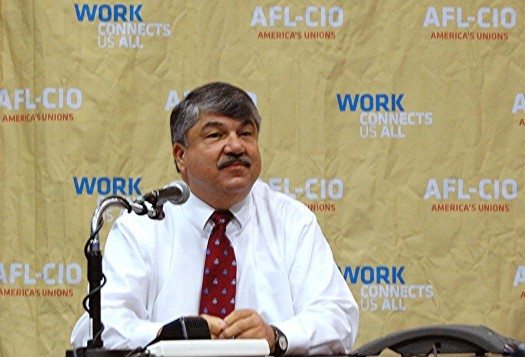
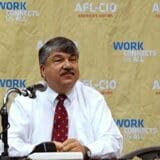
Massachusetts Senator Elizabeth Warren opened the AFL-CIO’s quadrennial convention in Los Angeles yesterday with a stirring tribute to the legacy of organized labor and a call to arms for the country’s progressive cause.
Speaking before about 5,000 cheering delegates at the L.A. Convention Center, Warren rolled out a list of issues near to labor’s heart. These included a raise in the minimum wage, tougher policing of Wall Street and government investment in infrastructure, jobs and education. She also called for transparency in the Obama administration’s ongoing secret negotiations of the Trans-Pacific Partnership (TPP) trade agreement.
She reserved some of her harshest words for what she called “the increasing corporate capture of the federal courts” and charged that Supreme Court Justices Alito and Roberts topped the list of the most pro-corporate and anti-consumer justices of the past 50 years.
The remarks were in sync with those of AFL-CIO President Richard Trumka,
» Read more about: AFL-CIO Convention: Inclusiveness and Bridge-Building »


The number of families with children and at least one unemployed parent jumped by 33 percent in recent years, going from 2.4 million to 3.2 million households between 2005 and 2011, the U.S. Census Bureau reported.
The Great Recession – the nation’s worst in decades – caused much of the increase, the Census Bureau said in an Aug. 27 statement, adding that some states, such as Florida, Nevada, Hawaii, Connecticut, New Jersey, California and North Carolina had growth rates higher than the national average.
Those states had a range of 54 percent for North Carolina to 148 percent for Nevada. Florida, for example, had a 93 percent increase in families with at least one unemployed parent and California had a rate of 61 percent, the Census Bureau said, citing its America’s Families and Living Arrangements: 2012 report.
“During the recession, economic well-being worsened for families with children,” Jamie Lewis,
» Read more about: Unemployment in American Families With Kids Jumps »

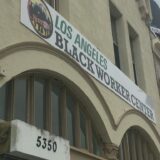
This Friday, the Los Angeles Black Worker Center (BWC) is holding its first-ever Black Workers Congress to bring workers and the Los Angeles community together to build support and share knowledge to transform the jobs crisis in communities of color.
The Workers Congress will be held at the Holman United Methodist Church on W. Adams Boulevard in Los Angeles starting at 8 a.m. PDT.
Black Worker Center Director Lola Smallwood Cuevas:
“The Black Worker Congress is about building blueprint for strategy and action directed by unemployed, underemployed and unionized black workers together. The black job crisis is one of the greatest worker rights travesties in America. This congress is an opportunity for labors to be directed by the community and see how they can help black workers move forward action steps to contest the economic violence terrorizing our families and destroying the social fabric of our community.”
» Read more about: African American Labor Group Debuts “Workers Congress” »


Retail giant Walmart suffered a setback in Los Angeles Superior Court Wednesday when Judge Allan J. Goodman ruled that Burbank’s city government improperly greenlighted Walmart’s plans to put a store in the sprawling Empire Center shopping complex.
Goodman, according to the Burbank Leader, “citing street improvements more than a dozen years overdue and a flawed environmental impact report, [said] that the city of Burbank must rescind building permits it issued to Walmart.”
Walmart had planned to open an outlet (which would include a grocery store) in an old Great Indoors space next year, but three Burbank residents filed a suit to block that plan. (The Empire Center, which sits on former Lockheed property, already includes a Target and Lowe’s, and a Costco is located adjacent to the center.)
City News Service reported that the plaintiffs contended “that having a Walmart at the site would violate a zoning law banning grocery stores in the center.
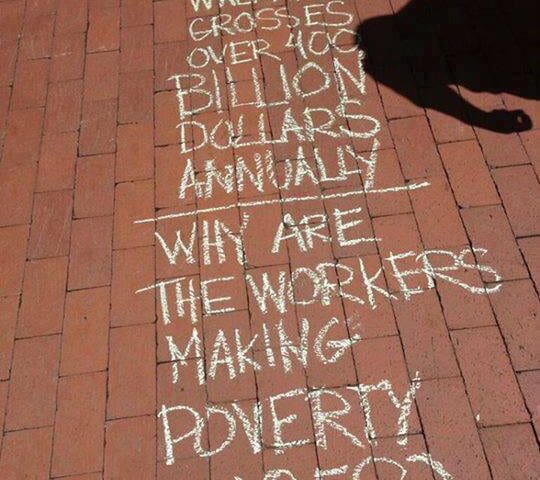

Dear Walmart Management,
I am the pastor at Fairview Community Church in Costa Mesa, California. A few months ago, on June 25, 2013, along with six fellow pastors from around the nation, I visited the Lakewood Walmart with the hope of discussing the retaliations that have taken place nationwide following a worker strike and demonstration in Bentonville, Arkansas. We came to beseech you to reinstate Jovani Gomez, an associate of the Lakewood Walmart who we believe was fired unjustly following his participation in that action.
We were unable to discuss Mr. Gomez’s case, or any of the firings or retaliations. We were hardly able to discuss anything at all. Instead, we were met inside the store just a few feet from the entrance by one of the store’s managers, who made it clear that we were not welcome inside Walmart (he actually stated as much). Incredibly, this manager then called the police on seven peaceful pastors who simply wished to discuss Walmart’s recent actions toward their employees.
» Read more about: Minister to Walmart: You Can’t Fire God »


Shadows reach,
dapple the asphalt.
Hawks whoop,
surfing air.
Tumble weeds cling
ready to roll.
Desert breath blows,
tree tops twist.
Sweat salts my skin.
I itch.
All it takes is one
red spark.
I kneel down—watch
as the wind
picks it up. I withdraw,
stare
at what I’ve unleashed
on every channel
No one knows.
Nothing can stop it.
I burn.
I don’t need anyone,
closer now—so high
I can’t stop.
———————————————————–
Marilyn N. Robertson’s work has been published in Speechlessthemagazine, The Boston Literary Magazine, Chopin with Cherries, A Tribute in Verse, and is forthcoming in The Poetry Mystique, to be published by Duende Books. She was a featured reader in “Viva Poetry,”
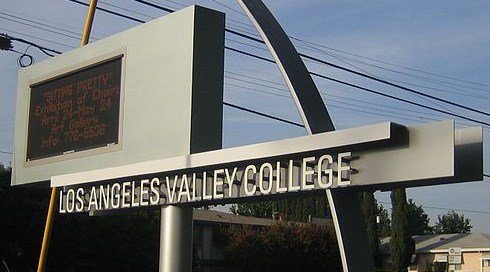

President Obama [has] released a plan to combat rising college costs and make college affordable for American families. The president’s plan outlines three proposals: tying federal student aid to college performance based on yet-to-be developed college rankings; promoting innovation and completion by instituting a college scorecard that would give consumers clear, transparent information on college performance to help them make the decisions that work best for them; and ensuring that student debt remains affordable by expanding eligibility for the Pay As You Earn repayment program. While this federal push is new, many of the ideas have already been tried and tested on the state level, and California’s community college system in particular provides some important data on what we should expect as these proposals are developed.
As a student who has attended community college and is attending a public university, I applaud President Obama for taking this step toward ensuring an affordable higher education for all.
» Read more about: California Community Colleges: Models for Curbing Costs »


Many of us try to be diligent about putting our empty bottles and cans in the blue recycling bin, but what do we do with our apple peels and coffee grounds? Can our lunch leftovers impact the air we breathe and the local economy?
All too often, these food scraps end up in a landfill, where they decompose and emit dangerous levels of methane — a greenhouse gas considered 21 times more damaging to the climate than carbon dioxide. Businesses and residents from the City of Los Angeles send approximately 1.2 million tons of food scraps and yard waste into landfills each year, equivalent to the weight of 600,000 automobiles. Such compostable “organic” material forms nearly a third of California’s landfilled waste.
Recycling instead of landfilling our organic materials only improves our environment, it creates jobs. The Tellus Institute calculated that recovering and recycling our organic materials creates nearly twice the number of jobs as when the same materials are disposed.
» Read more about: How Leftovers Will Let Us Breathe Easier and Create Jobs »


Benjamin Gamboa doesn’t know John Arnold, but they are linked by a shared concern over the fate of public-employee pensions in California.
“I’m proud to have a pension,” the 30-year-old Gamboa says. “I believe every American should have a pension.”
The two men live in very different worlds. Gamboa is a research analyst at Crafton Hills College in Yucaipa, California. Arnold is a hedge-fund billionaire from Houston, Texas.
There’s another difference between them: Arnold recently had a representative present at a secret “pension summit” held at a Sacramento hotel, where strategies to limit public employee retirement benefits were discussed; Gamboa, a union member, did not – representatives of labor were specifically not invited.
“Pension reform” has become the latest battle cry in a seemingly endless war that has ostensibly been declared against tax-dollar waste, but whose single-minded purpose has been to slash the job protections and benefits enjoyed by California’s working middle class.
» Read more about: Slash and Burn: The War Against California Pensions »


Congress will reconvene shortly. That means more battles over taxes and spending, regulations and safety nets, and how to get the economy out of first gear. Which means more gridlock and continual showdowns over budget resolutions and the debt ceiling.
But before the hostilities start again and we all get lost in puerile politics and petty tactics, it’s useful to consider what’s really at stake for our economy and democracy.
For much of the past century, the basic bargain at the heart of America was that employers paid their workers enough to buy what American employers were selling. Government’s role was to encourage and enforce this bargain. We thereby created a virtuous cycle of higher living standards, more jobs, and better wages. And a democracy that worked reasonably well.
But the bargain has been broken. And until it’s remade, the economy can’t mend and our democracy won’t be responsive to the majority.
» Read more about: Why We Fight: Restoring the American Dream »


As the New York Times reported on August 27 (“At Charter Schools, Short Careers By Choice”) most charter school teachers only remain in the profession for two to five years. In contrast, traditional public school teachers average nearly fourteen years of experience. But in the fantasy world of charter school proponents, far from being a shortcoming this lack of teaching experience is a positive. One charter school official told the Times, “There is a certain comfort level that we have with people who are perhaps going to come into YES Prep and not stay forever.” Wendy Kopp, whose Teach for America program is criticized for high turnover, said “The strongest schools develop their teachers tremendously so they become great in the classroom even in their first and second years.”
I’ve never met a teacher who believes they were “great” in their first two years.
» Read more about: Charter School Kool-Aid: Experience “Doesn’t Matter” »


Why are so many Americans wary of labor unions? Unions are, after all, good for everyone who works for a living. In occupations with a high rate of unionization all the workers get paid more, even employees who aren’t in a union. As rates of unionization have fallen, so has compensation. One might expect unions to be all the rage with anyone who ever put in a hard day’s work. But this is not always the case, particularly in the United States.
Americans have WEIRD attitudes towards unions – as in, Western, Educated, Industrialized, Rich, and Democratic. The Canadian behavioralists who coined this acronym were interested in how sweeping generalizations about human psychology and economic behavior might be incorrect if they were based on only one kind of (WEIRD) people, and reviewed a number of cross-cultural studies to make their point. To scholars at the University of British Columbia,


We couldn’t resist. The Fourth of July is the biggest and baddest of all barbecue bonanzas, and so we decided the Union Cookout needed a sequel for Labor Day. Labor 411 is here with our follow-up to last year’s grill special that includes some of the best union-made picnic and party goods around.
(Reposted from Labor 411.)
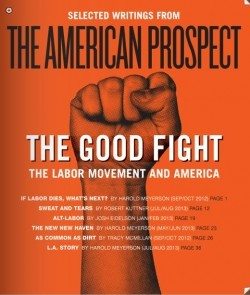

Check out this handy collection of American Prospect stories on the state of labor and the labor movement in the U.S. The anthology, The Good Fight, can be browsed online or downloaded for offline reading.
It features pieces by Robert Kuttner, Tracy McMillan, Josh Eidelson and Harold Meyerson — including Meyerson’s recent profile of the Los Angeles Alliance for a New Economy, “L.A. Story.”
Perfect reading for this Labor Day weekend!


As our nation pauses to observe Labor Day this week, you have to wonder what the future holds for American workers. Rising income inequality, a dwindling middle class, the growth of low-wage jobs without benefits, and unemployment rates that remain uncomfortably high should make us wonder whether we’ve allowed the American Dream to become a mythic fairy tale.
While these realities are certainly dire and downright depressing, they are not insurmountable.
Last month, President Obama began laying out a plan to rebuild America’s manufacturing base and shore up job security with good wages in stable industries. He called for rewarding companies for keeping jobs at home or bringing them back to the U.S. And, he said that we can and must train workers — especially those left farthest behind by the economic downturn — to get on new career tracks that lead them to the middle class.
» Read more about: Transit Investments Can Get Manufacturing Moving Again »


Of all the commemorations of the March on Washington, the one that will best capture its spirit isn’t really a commemoration at all. Thursday, one day after the 50th anniversary of the great march, fast-food and retail workers in as many as 35 cities will stage a one-day strike demanding higher wages.
Sadly, the connection between the epochal demonstration of 1963 and a fast-food strike in 2013 couldn’t be more direct.
The march 50 years ago was, after all, a march “For Jobs and Freedom,” and its focus was every bit as economic as it was juridical and social. Even more directly, one of the demands highlighted by the march’s leaders and organizers was to raise the federal minimum wage — then $1.15 an hour — to $2. According to Sylvia Allegretto and Steven Pitts of the Economic Policy Institute,
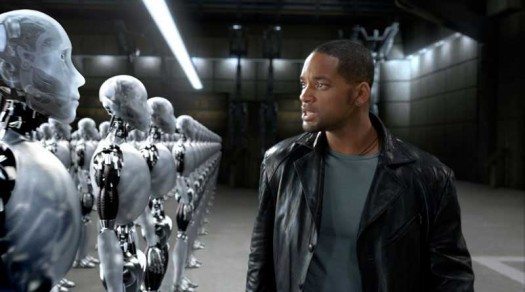

With robots taking over factories and warehouses, toll collectors and cashiers increasingly being replaced by automation and even legal researchers being replaced by computers, the age-old question of whether technology is a threat to jobs is back with us big time. Technological change has been seen as a threat to jobs for centuries, but the history tells that while technology has destroyed some jobs, the overall impact has been to create new jobs, often in new industries. Will that be true after the information revolution as it was in the industrial revolution?
In an article in The New York Times, David Autor and David Dorn, who have just published research on this question, argue that the basic history remains the same: While many jobs are being disrupted, new jobs are being created and many jobs will not be replaceable by computers. While there is good news in their analysis for some in the middle-class,
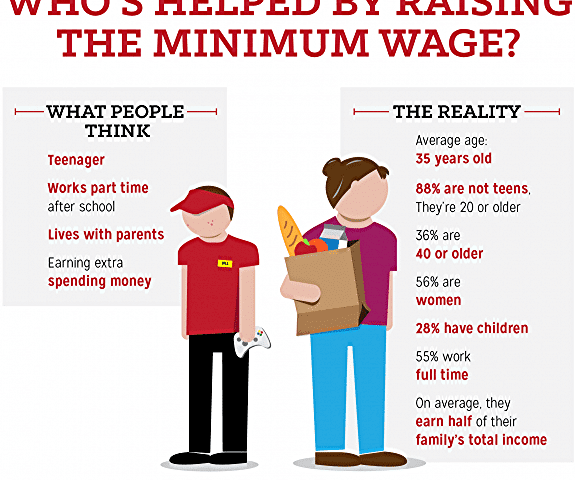
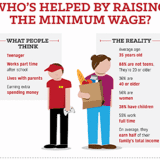
Infographic Source: Economic Policy Institute
(Today’s Los Angeles Times reported that strike actions against local fast-food outlets, launched by workers demanding a living wage, began early this morning. The following story from Equal Voice News sets the background for this day of national action.)
Fast food workers – who say their hourly wages are not enough to keep up with the cost of living – are planning a nationwide strike Thursday in about 35 cities. The industry employs about four million people.
Their message to restaurant chain owners and the public: Because of the pay, they often have to pit buying food against paying for their housing – and that, they say, seems strikingly odd in the United States.
In fact, some say they need food stamps to survive despite being employed.
Restaurant associations and representatives from fast food outlets point to the jobs as cooks and cashiers as opportunities to move up the career ladder – especially to become a manager and earn more money.
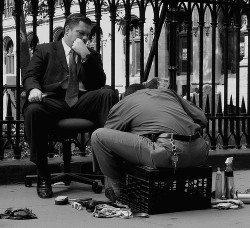

A few days ago I had breakfast with a man who had been one of my mentors in college, who participated in the struggle for civil rights in the 1960s and has devoted much of the rest of his life in pursuit of equal opportunity for minorities, the poor, women, gays, immigrants — and also for average hard-working people who have been beaten down by the economy. Now in his mid-80s, he’s still active.
I asked him if he thought America would ever achieve true equality of opportunity.
“Not without a fight,” he said. “Those who have wealth and power and privilege don’t want equal opportunity. It’s too threatening to them. They’ll pretend equal opportunity already exists, and that anyone who doesn’t make it in America must be lazy or stupid or otherwise undeserving.”
“You’ve been fighting for social justice for over half a century. Are you discouraged?”
“Not at all!” he said.


Fruitvale Station will not make many people’s lists as the feelgood film of the summer – it’s a semi-fictional account of the last day in the life of Oscar Grant, the troubled young black man who was mortally wounded by a transit police officer on an Oakland BART platform in 2009. Director Ryan Coogler’s debut movie opens with actual grainy cell phone footage, taken by bystanders, of the chaotic moments leading to Grant’s shooting after a melee had erupted on a train full of New Year’s Eve revelers.
Yet the story remains a powerfully optimistic work that shows Grant (Michael B. Jordan), in his last day alive, coming to terms with his criminal past as a small-time drug dealer. We watch as he tries to move his life in a new direction and become a better husband and father. And, despite Grant’s recurring moments of explosive personal confrontations, Coogler’s film knows when to pull back and take a restrained,